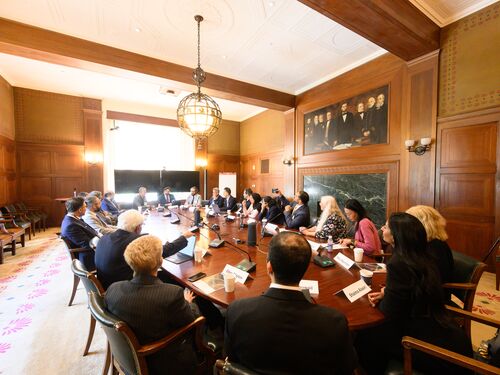Earth Day Resources from the National Academies
Feature Story
By Sydney O’Shaughnessy
Last update April 20, 2023
To mark Earth Day, the National Academies are highlighting a selection of our projects and activities aimed at addressing climate change, protecting the environment and natural resources, and advancing progress toward a more sustainable planet for everyone.
We recently announced a major new initiative, Climate Crossroads, which will focus multidisciplinary expertise and resources on key pathways to help the nation tackle the climate crisis. This initiative will build upon decades of National Academies work on understanding the causes and consequences of climate change and identifying solutions.
Our independent, objective advice and guidance have also helped shape sound policy and raise awareness on other key environmental issues, from protecting the Florida Everglades and the Gulf of Mexico region to sounding the alarm on biodiversity loss.
Explore selected resources here:
Programs and Initiatives
Reports and Other Resources
Greenhouse Gas Emissions Information for Decision Making (interactive overview)
Accelerating Decarbonization of the U.S. Energy System (interactive overview)
Address Climate Change and Breathe Easier with Research on Transportation Emissions (blog post)
Biodiversity at Risk: Today’s Choices Matter (interactive overview)
An Assessment of Native Seed Needs and the Capacity for Their Supply
Reckoning with the U.S. Role in Global Ocean Plastic Waste (interactive overview)
A National Strategy to Reduce Food Waste at the Consumer Level (interactive overview)
Review of Fate, Exposure, and Effects of Sunscreens in Aquatic Environments and Implications for Sunscreen Usage and Human Health (interactive overview)
Chemistry of Fires at the Wildland-Urban Interface (interactive overview)
Antarctic Science: Why U.S. Leadership and Investments Matter
Current Methods for Life-Cycle Analyses of Low-Carbon Transportation Fuels in the United States
Educator Tools
Design the Future: A Toolkit for Change — Project-based learning assignment that allows students to design a city of the future while addressing climate change, disaster resilience, and other issues
Red Wolf: Implications for Species Taxonomy — Enables students to explore the genomic processes involved during hybridization and interpret and explain these outcomes and their implications for the classification of species
More like this
Events
Right Now & Next Up
Stay in the loop with can’t-miss sessions, live events, and activities happening over the next two days.
TRB Annual Meeting | January 11 - 15, 2026
January 11 - 15, 2026 | The TRB Annual Meeting brings together thousands of transportation professionals worldwide for sessions across all modes and sectors.



